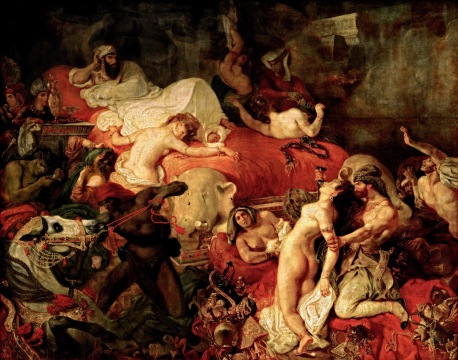 The Biblical authors occasionally attribute to God and Christ the designation “king of kings.” Paul names God the Father “king of kings” in 2 Timothy 6:15 and YHWH is praised as “lord of lords” across the Hebrew scriptures (Deuteronomy 10:17, Psalms 136:3). Likewise, Christ rides out to conquer the kings of the nations as “king of kings and lord of lords” in Revelation 19:6 (cf. 1:5).
The Biblical authors occasionally attribute to God and Christ the designation “king of kings.” Paul names God the Father “king of kings” in 2 Timothy 6:15 and YHWH is praised as “lord of lords” across the Hebrew scriptures (Deuteronomy 10:17, Psalms 136:3). Likewise, Christ rides out to conquer the kings of the nations as “king of kings and lord of lords” in Revelation 19:6 (cf. 1:5).
That God and Christ are worthy of such titles is clear. But how these epithets should be understood in light of the Biblical narrative is more difficult to discern.
Nebuchadnezzar, king of kings
The prophet Daniel’s awkward confession of king Nebuchadnezzar of Babylon as “king of kings” and “lord of all things” might provide some insight into how these titles function within the Biblical framework, particularly in reference to Christ (Daniel 2:37-38). Before interpreting Nebuchadnezzar’s dream Daniel says:
You, O king, the king of kings—to whom the God of heaven has given the kingdom, the power, the might, and the glory, into whose hand he has given human beings, wherever they live, the wild animals of the field, and the birds of the air, and whom he has established as lord over all things (κατέστησέν σε κύριον πάντων).
That these words come out of the mouth of a Hebrew prophet and not a pagan sycophant is surprising. Less surprising, though, when we realize that for Daniel these titles function on a concrete earthly plane rather than on a spiritual plane: Nebuchadnezzar is quite literally the human ruler of all kings and lord of all things. So rather than exalting a mere man to a place of divinity, Daniel’s words position the emperor in his proper place within the divine hierarchy. Nebuchadnezzar is the viceroy and magistrate of Israel’s God, the God of all the earth. His power and authority are wholly derived from God’s sovereignty. Neither the pagan gods nor Nebuchadnezzar himself established Babylonian supremacy; it was God.
At least in the case of Nebuchadnezzar then, supreme kingship and supreme lordship were functional and earthly attributes. They referred to the concrete political authority given by God, the great δεσπότης who is the source of all power. Nebuchadnezzar’s reign then was the manifestation of God’s own kingship over the earth for a brief period of time; a divine kingship primarily interested in judging and refining Israel through exile.
Christ, king of kings
In reading the book of Revelation it becomes clear that Christ’s status as king of kings and lord of lords operates on the same earthly plane as Nebuchadnezzar’s. Just like the Babylonian king, Christ was awarded “authority over the nations from [his] Father” along with “power and wealth and wisdom and might and honor and glory and blessing” (Revelation 2:27-28, 5:12, cf. 3:21). But unlike the power and glory given to Nebuchadnezzar, Christ’s royal equipment will be directed against the church’s enemies, Babylon and the kings of the nations. Having been empowered by God, this new king of kings will wage war against the rebellious kings of the earth (Revelation 19, 6:15). With Babylon and its client kings removed, only Christ’s rule will remain.
Christ is thus shown to be a kind of earthly emperor both by what he receives (power and glory) and by what he does does with those blessings (subjugate the nations). Although the immortal Christ attained an everlasting kingship rather than a fleeting one, the epithets “king of kings” and “lord of lords” have not been radically reinterpreted from Daniel to Revelation. Christ’s kingship, like Nebuchadnezzar’s, would be the means by which God secured his judgements on the earth. For John, the immediate and primary significance of this kingship was found in the coming realignment of the pagan Greco-Roman political order. The power with which Roman Babylon tormented the churches would be plucked away and the pagan kings aligned with Babylon would be forced to submit to God and his Christ. Thus the centuries old problem of pagan empire would come to an awesome close.
7 thoughts on “Who is the king of kings?”